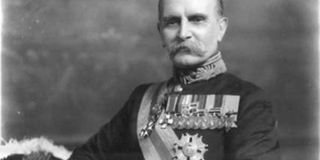Lugard arrives armed and unannounced

Frederick Lugard.
What you need to know:
Begrudging signature. Frederick Lugard arrives, picks a site where to erect a fort unlike previous visitors who would seek permission. A confident Lugard, just a week after his arrival in Buganda, presents the Kabaka a treaty to sign. A treaty that Kabaka Mwanga signs wary of war if he does not.
Kabaka Mwanga’s refusal to sign an agreement brandished at him by Fredrick Jackson of the Imperial British East Africa Company (IBEAC) was his first act of defiance against the imperialists. This would not be his last.
Set up by the Scottish shipping magnate, William Mackinnon, in 1877, IBEAC had been granted a royal charter to govern the area of the East African interior earlier declared as a British “sphere of influence” at the 1884 Berlin Conference.
While the term “sphere of influence” did not necessarily mean ownership over the area, Jackson had tried unsuccessfully to enforce such a claim on Mwanga after the German Karl Peters had signed a trade agreement with the Kabaka.
Having failed to convince Mwanga, Jackson, whose tour of duty had come to an end, led a delegation that included representatives of the Catholics and the Protestant missions in Buganda to the consulates at Zanzibar in an effort to resolve the standoff.
His replacement – Frederick John Dealtry Lugard, a Sandhurst-trained British soldier and mercenary with a take-no-prisoners approach to resolving conflict – would play a crucial role in the colonisation of Buganda and Uganda.
Previous visitors to Buganda would have arrived on the outskirts of the kingdom and sent ahead gift-carrying messengers to seek permission to visit.
Lugard arrived unannounced in Buganda on December 18, 1890, in the company of 50 Sudanese soldiers, 70 Somali soldiers and 270 porters.
He did not carry any of the customary presents for the Kabaka but had with him an old and functional Maxim gun which could fire 500 rounds a minute and had changed the dynamics of warfare wherever it had been introduced to conflicts on the continent.
Where other foreign visitors had politely asked the Kabaka for permission and land on which to set up their homes, Lugard picked a choice spot on present-day Old Kampala Hill and set up his camp, overlooking Mwanga’s palace at Mengo.
Then he sent word – not permission – across the valley to Mengo that he was now ready to see the king.
Mwanga was impressed by Lugard’s confidence but not moved by his attempts to get the Kabaka to sign away his kingdom.
Lugard’s own instructions were unrealistic.
The instruction disobeyed
On September 16, 1890, Sir Francis de Winston of IBEAC had instructed him to consolidate the Protestant Party and conciliate the Catholics.
This was impractical, seeing as the Catholics were, at that point the stronger party in Buganda and counted Mwanga among their allies.
The IBEAC had chosen to tread lightly in Buganda and one of its directors, George Mackenzie, had advised Lugard to offer the Maxim gun to Mwanga as an inducement to get him to sign the treaty.
However, Lugard chose to play by his own rules.
He had crept up on Buganda through the sensitive eastern route through Busoga without waiting for the guides that Mwanga had sent to meet and escort him. Then he had evicted occupants of Old Kampala Hill, his endeared spot, and now wanted Mwanga to sign an agreement handing over his kingdom to the IBEAC.
Quite some nerve, it must be said.
On December 24, 1890, just a week after his arrival, Lugard was almost shot by some of Mwanga’s men in a heated discussion over the treaty but was saved by Zakaria Kisingiri, who would later become his major-domo, father-in-law, a key collaborator and a regent of the crown.
The history of Uganda and Buganda might have been different if Lugard had been shot dead that day.
Despite his braggadocio, Lugard’s position was not as strong as it appeared. He only had 11 bullets for each of his 120 soldiers, his Maxim gun was unreliable and he was desperately waiting for the arrival of his assistant, Capt. Williams, who was carrying ammunition.
Mwanga, on the other hand, had continued to strengthen his position since returning to power, through the supply network of Charles Stokes, the missionary-turned-arms dealer (who Lugard wrote to commanding him to stop supplying the Kabaka).
On December 26, 1890, Lugard presented an agreement for Mwanga to sign. The agreement was a clear and unambiguous declaration of a war against Buganda’s independence.
Continues tomorrow




